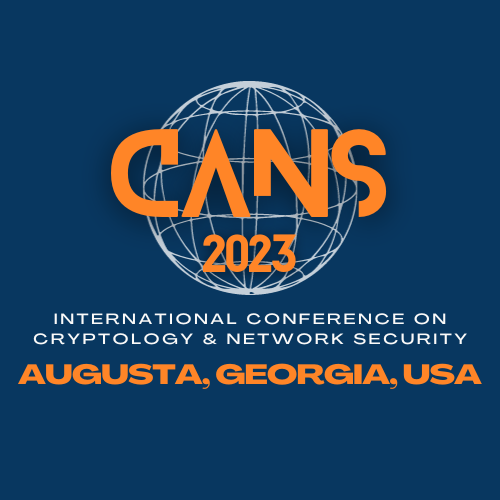CANS 2023 - Call for Papers
The 22nd International Conference on Cryptology and Network Security (CANS) spans current advances in all aspects of cryptology, data protection, and network and computer security. The session proceedings and recommendations will be published in the Lecture Notes in Computer Science series by Springer.
CANS 2023 will take place from October 31st to November 2nd, 2023, in Augusta, Georgia, USA.
Submission Deadline: July 13th, 2023
Paper Notification: August 10, 2023
Camera-Ready Deadline: August 30, 2023

Submission Guidelines
High quality papers on unpublished research and implementation experiences may be submitted. All papers must be original and not substantially duplicated work that has been published at, or is simultaneously submitted to, a journal or another conference or workshop. All submissions must be written in English and span no more than 20 pages in the Springer’s Lecture Notes in Computer Science (LNCS) format (a Springer template can be found in Overleaf), including title, abstract, and bibliography. The introduction should summarize the contributions of the paper at the level understandable by a non-expert reader and explain the context to related work.
Submitted papers may contain supplementary material in the form of well-marked appendices of any length. However, the main paper should be intelligible without requiring the reader to consult supplementary material. Submissions must be anonymous (no author names, affiliations, acknowledgments, or obvious references). The conference will also consider short papers of up to eight pages in the LNCS format, excluding the bibliography, for results that are not yet fully fleshed out or that simply require few pages to describe but still make a significant contribution.
All submissions must be processed with LaTeX2e according to the instructions given by Springer. Submitted manuscripts must be typeset in plain Springer LNCS format, in particular without changing the font size, margins or line spacing. Submissions not meeting these guidelines may be rejected without consideration of their merits.
Papers must be submitted electronically in PDF format via EasyChair.
Presentation and Publication
At least one author of every accepted paper must register and pay the full registration fee (non-student) for the conference by the early registration deadline indicated by the organizers. Papers without a registered author will be removed from the sessions. Authors must present their own paper(s). Session proceedings, including all accepted papers, will be published in LNCS and will be available at the conference.
Topics
- Access Control
- Anonymity & Pseudonymity
- Applied Cryptography
- Attacks & Malicious Code
- Authentication & Identification
- Biometrics
- Block & Stream Ciphers
- Blockchain Security and Privacy
- Cryptographic Algorithms and Primitives
- Cryptographic Protocols
- Cyber Physical Security
- Data and Application Security
- Denial of Service Protection
- Data Protection
- Data and Computation Integrity
- Embedded System Security
- Formal Methods for Security
- Hash Functions
- Identity Management
- Key Management
- Malware Analysis and Detection
- Network Security
- Peer-to-Peer
- Privacy-Enhancing Technologies
- Public Key Cryptography
- Security & Privacy
- Security and Privacy for Big Data
- Security and Privacy in the Cloud
- Security in Content Delivery
- Secure Computation
- Secure Distributed Computing
- Security in Pervasive Systems
- Security in Social Networks
- Sensor Network Security
- Security in Crowdsourcing
- Security Architectures
- Security in Grid Computing
- Security Metrics
- Security in the Internet of Things
- Security Models
- Security in Location Services
- Security Policies
- Trust Management
- Usable Security
- Virtual Private Networks
- Wireless and Mobile Security
- Zero-Knowledge Proofs